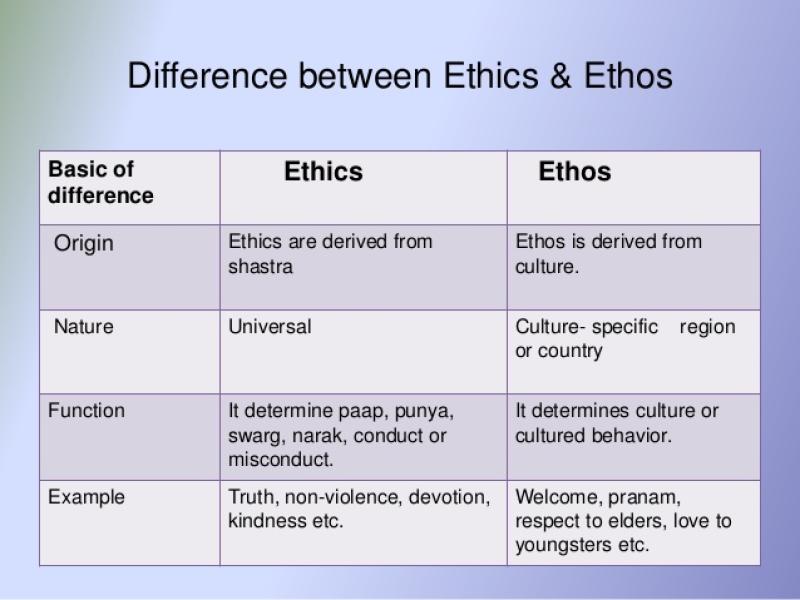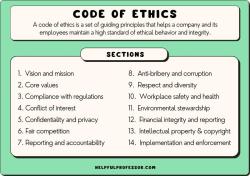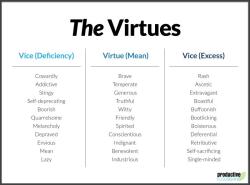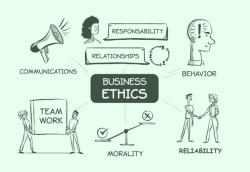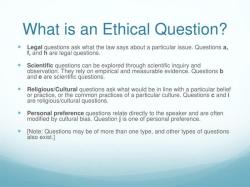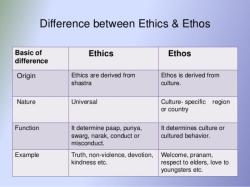Why is ethics distinct from other disciplines?
Ethics stands out as a distinct discipline due to several key aspects:
Normative Nature: Ethics is concerned with defining what is right or wrong, good or bad, and the principles that guide moral behavior. Unlike descriptive disciplines that describe how things are, ethics focuses on how things ought to be.
Subjectivity and Universality: Ethics involves subjective judgments about values and morality. While ethical principles may vary across cultures and individuals, there's also a quest for universal principles that transcend specific contexts.
Interdisciplinary Nature: Ethics intersects with various disciplines like philosophy, psychology, sociology, law, and more. It doesn't belong exclusively to any single field but is interwoven into many disciplines as it influences decision-making and behavior.
Critical Thinking and Reasoning: Ethics involves critical thinking and reasoning to evaluate moral dilemmas and make ethical judgments. It challenges individuals to analyze, weigh options, and consider consequences before making ethical decisions.
Application to Human Behavior: Ethics focuses on human conduct, values, and morality. It examines the motives behind actions and aims to guide behavior in personal, professional, and societal contexts.
Ethical Dilemmas and Controversies: Ethics often deals with complex dilemmas where there's no clear-cut right or wrong answer. This complexity leads to ongoing discussions and debates, making ethics an evolving and dynamic field.
Prescriptive and Reflective Nature: Ethics not only prescribes how individuals should behave but also encourages reflection on moral principles and values. It promotes self-awareness and self-examination of one's moral compass.
Impact on Society: Ethical considerations play a significant role in shaping laws, policies, and societal norms. Ethical decisions made by individuals, institutions, or governments have far-reaching consequences for society as a whole.
While other disciplines may touch upon ethical considerations within their frameworks, ethics as a separate discipline focuses specifically on the study of moral principles, values, and ethical decision-making. Its distinctiveness lies in its focus on guiding human behavior in morally challenging situations and its interdisciplinary nature, influencing various aspects of human life and society.
What aspects differentiate ethics from other academic disciplines?
Ethics occupies a unique and fascinating space within the academic landscape, distinguished by its distinct characteristics and contributions to human understanding. Here are some key aspects that set ethics apart from other disciplines:
Focus on normative questions: Unlike many disciplines concerned with "what is," ethics grapples with "what ought to be." It delves into questions of morality, values, and right and wrong. This normative focus leads to debates about how one should live, act, and make decisions in diverse situations.
Interdisciplinary nature: Ethics doesn't exist in a vacuum. It thrives on drawing insights and perspectives from various disciplines, including philosophy, psychology, sociology, anthropology, economics, and even literature. This interdisciplinary approach enriches ethical discussions by considering diverse contexts, cultural variations, and human behavior.
Application to real-world problems: While some academic disciplines seem abstract or theoretical, ethics directly impacts our everyday lives. It provides frameworks for analyzing and addressing pressing societal issues, like environmental degradation, technological advancements, healthcare dilemmas, and social injustices. By offering ethical guidance, it helps us navigate complex choices and promote responsible action.
Emphasis on critical thinking and reasoning: Engaging with ethical theories and arguments cultivates critical thinking skills crucial for informed decision-making. It encourages us to question assumptions, analyze different perspectives, and develop sound reasoning skills to justify our ethical stances.
Open-ended dialogue and debate: Unlike disciplines with more definitive answers, ethics thrives on open-ended discussions and debates. There's rarely a single "correct" answer, and diverse viewpoints are encouraged. This fosters intellectual humility, tolerance for ambiguity, and the ability to consider multiple perspectives in reaching ethical conclusions.
Personal and transformative potential: Exploring ethical questions isn't merely an academic exercise. It can be a highly personal and transformative experience. Engaging with ethical dilemmas can challenge our existing values, prompt self-reflection, and encourage personal growth as we strive to live ethical lives.
In conclusion, ethics stands out for its unique focus on normative questions, its interdisciplinary nature, its application to real-world problems, its emphasis on critical thinking, its open-ended dialogue, and its potential for personal transformation. This distinctive combination makes ethics a valuable and enriching field of study that contributes significantly to our understanding of ourselves, our societies, and the choices we make in navigating the complexities of life.
